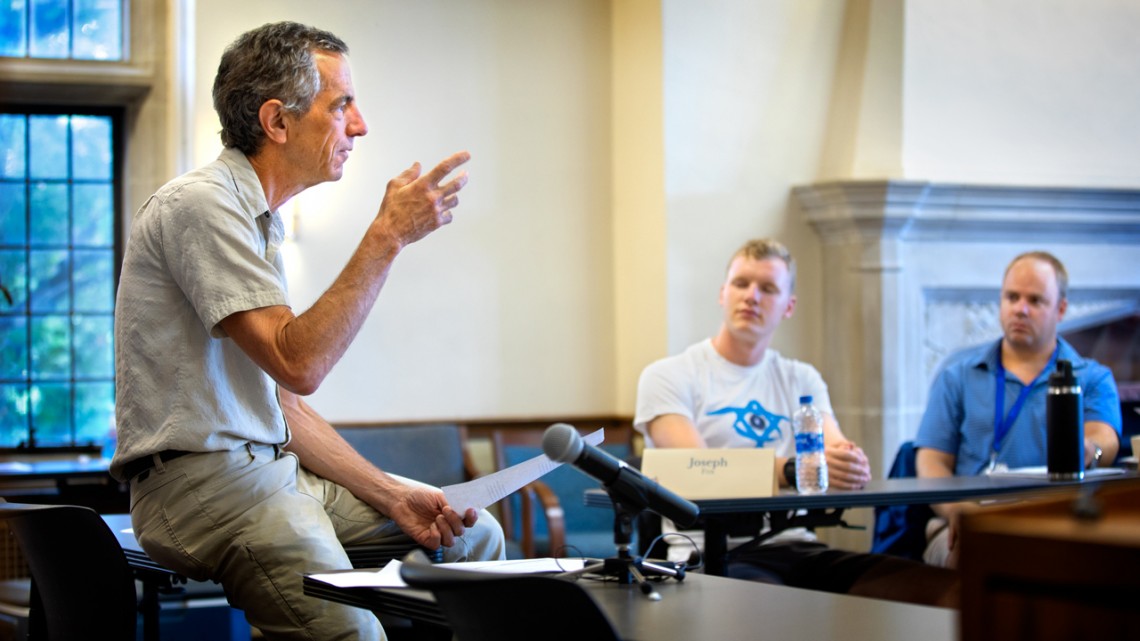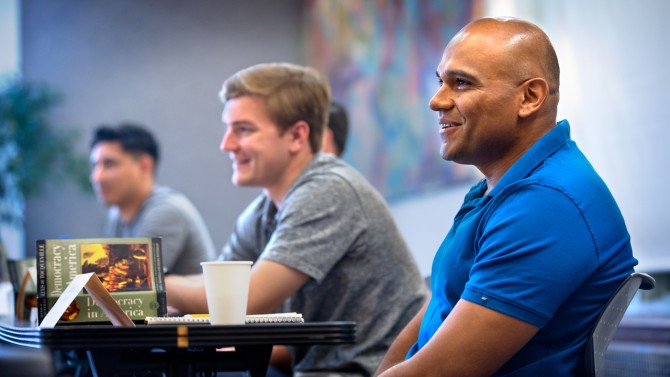
Deputy provost and professor of law John Siliciano leads a Warrior-Scholar Project seminar on the Constitution, July 23 at the Carol Tatkon Center.
Warrior-Scholar Project helps veterans adapt to demands of the classroom
By Daniel Aloi
Thirteen students came to campus July 20-28 for The Warrior-Scholar Project (WSP), an immersive college preparation experience for current and former enlisted service members.
The academic boot camp has partnered with Cornell since 2015. During the weeklong program, participants attend seminar-style classes in the liberal arts taught by Cornell faculty, and writing seminars and tutoring sessions led by graduate students and student veterans. The program guides participants as they learn how to frame their ideas in an academic context and think critically, and provides a range of skills for academic success.
Joseph Fox, until recently a military intelligence specialist in the Army, enters Georgetown University’s School of Foreign Service to study international relations as a junior this fall.
He enrolled in WSP because “coming in as a third-year without having been to the first two years of school in the traditional way, I’m trying to catch up,” he said. “Going out for intelligence training is not sitting in a classroom, but it still warranted college credits that were honored. This [program] is kind of taking that holistic education and channeling it into paper-writing.”
The WSP curriculum features five interdisciplinary seminars covering core concepts of citizenship and democracy, including discussions of the Declaration of Independence and the framework of the Constitution.
Seminars were led by Jamila Michener, assistant professor of government; Jeffrey Rachlinski, the Henry Allen Mark Professor of Law; John Siliciano, deputy provost and professor of law; classicist and military historian Barry Strauss, the Bryce and Edith M. Bowmar Professor in Humanistic Studies; and lecturer in history Kim Todt, M.A. ’09, Ph.D. ’12. Texts included Alexis de Tocqueville’s “Democracy in America” and Danielle Allen’s “Our Declaration,” as well as readings of essays and speeches by George Orwell, Frederick Douglass, Abraham Lincoln, Martin Luther King Jr. and others.
“I think this is the best program, and it’s really an honor to be able to teach it,” Rachlinski said to his class. “One advantage you have, whether you know it or not, is just a lot more self-discipline. One difficult thing about undergraduate education is no one tells you how to organize your time.”
Alex Gerberry, a Marine Corps intelligence specialist at Camp Pendleton, said: “We’ve been overloaded with work and papers to write; it’s definitely been an effective program so far.” He will transition out of the service in February and wants to pursue a dual major in history and economics.
“I’ve learned a lot and have been pushed to the limits mentally, which is good. I couldn’t recommend it enough,” said David Patch, a Marine Corps rifleman, who leaves active duty in December and is interested in studying finance or government and political science.
Other WSP sessions addressed building skills crucial to success in higher education, the college admissions process, and reflections and takeaways from the program as participants prepare for the transition to college.
Cornell is “definitely one of my top choices to apply to” for admission next year, said Trenton Hicks, an Army signals intelligence specialist, who leaves the service in the spring and wants to major in economics.
“Military people are disciplined, they’re motivated, they’re resilient,” said Cassie Michael, a campus coordinator for WSP. “The program is strengths-based, showing the ways the military has helped you to be successful in the classroom, and translating your military skills to this setting.”
The Warrior-Scholar Project was initiated in 2012 at Yale University and is offered to students at no cost. Now hosted by 18 colleges and universities nationwide, it has more than 275 participants this year.
“Given Cornell’s long-standing history of military education, which has been part of its land-grant mission from inception, we are delighted to partner with the Warrior-Scholar Project for a fifth year,” said Katherine McComas, vice provost for engagement and land-grant affairs, whose office coordinates the WSP at Cornell. “This project is an excellent opportunity to help veterans acclimate to college life, whether at Cornell or elsewhere, and have our campus culture enriched by their dedication, commitment and varied perspectives.”
Provost Michael I. Kotlikoff has championed the recruitment of service veterans to Cornell and other Ivy League schools, pointing out the limited enrollment of veterans at elite institutions. In the spring of 2017, he announced a goal of enrolling 100 undergraduate veterans at Cornell by 2020. The university had 41 veterans enrolled as full-time students in the fall of 2018.
“The Cornell student-veterans I’ve come to know go to military bases and junior colleges to recruit,” Kotlikoff said. “They convey the message that our institution is veteran-friendly, and that they will personally help to mentor those we admit.
“Their efforts, along with the Veterans Summer Bridge Program and the Warrior-Scholar Project, send a message that we welcome and support veteran applicants,” he said. “Their diverse backgrounds, experiences and views would be a valuable addition to our classrooms and campus life.”
Media Contact
Get Cornell news delivered right to your inbox.
Subscribe

